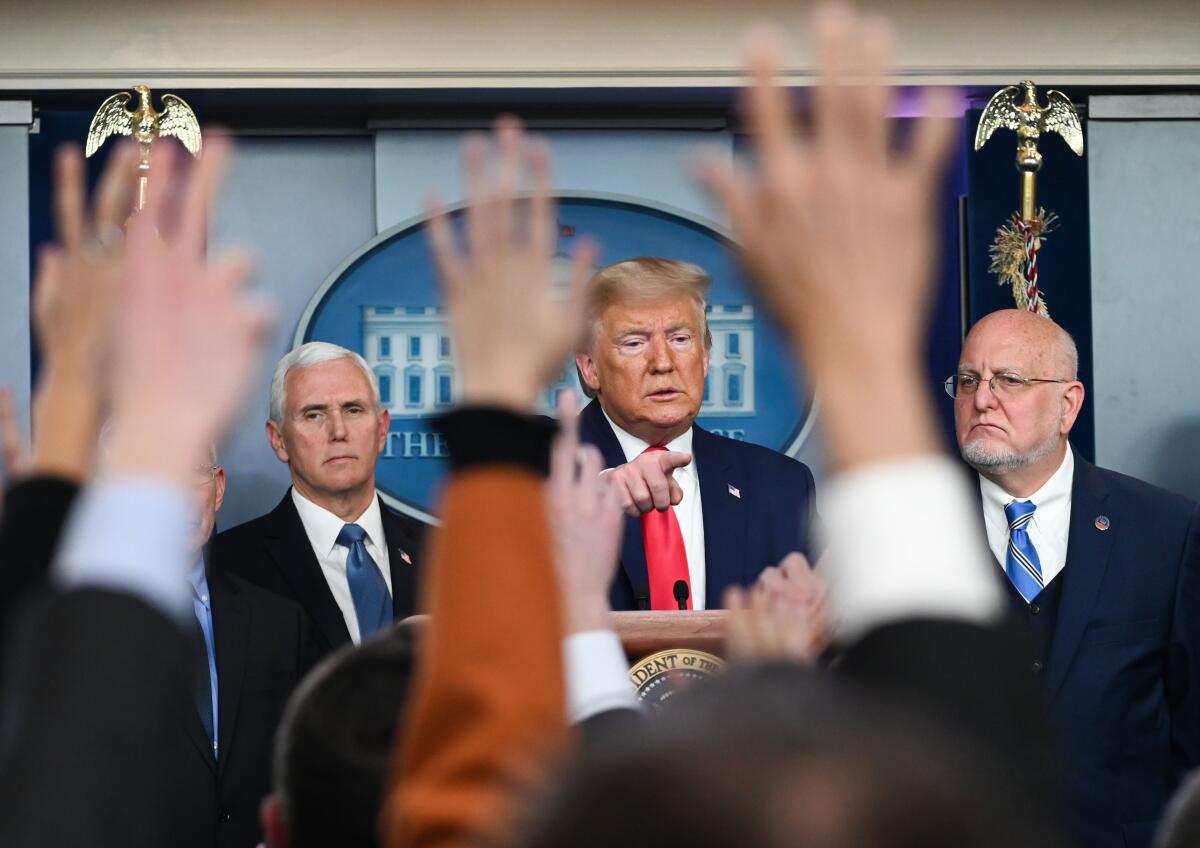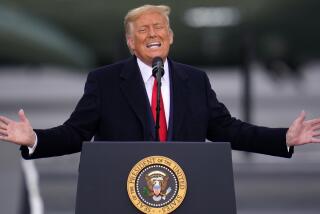Trump’s frustration with coronavirus: He can’t make a deal with it

- Share via
WASHINGTON — By his own account, President Trump never met a political or business rival or problem he couldn’t sweet-talk or club into submission with tariffs, threats or tweets.
But the new coronavirus outbreak that has killed 11 Americans so far, unleashed panic in communities and financial markets, led to emergencies in California and two other states, and ultimately could threaten Trump’s reelection bid, has posed a unique challenge to the president’s credibility and his administration’s managerial competence.
“A virus is not to be dominated. A virus is not somebody you get into a room and beat up on,” said Gwenda Blair, a Trump biographer who has studied his mindset for decades.
That simple but undeniable reality has frustrated Trump as he confronts the growing health crisis. On Friday, the White House abruptly canceled -- then rescheduled -- the president’s planned visit to the Centers for Disease Control and Prevention in Atlanta.
A CDC employee was suspected to have contracted the virus but later tested negative.
Trump has struggled to portray himself in control of the fast moving threat, which has led to more than 200 confirmed cases in at least 18 states, downplaying the risk and promising a vaccine long before one is likely. And the CDC has been under fire for multiple problems with its testing protocols and practices.
“Certainly, the administration is trying to show that it is in charge and on top of things, but sometimes political imperatives, particularly in an election year, don’t mesh with the science,” said Eric Miller, a global fellow at the Wilson Center, a nonpartisan public policy forum established by Congress.
“It’s hard to make a deal with diseases,” he added. “They’re going to go where they’re going to go.”
Congress clearly thinks the White House should do more. Both chambers this week overwhelmingly passed an $8.3-billion spending package — more than triple what Trump had requested — for additional coronavirus screening, vaccine research and other aid. Trump is expected to sign the bill.
But by almost any measure, Trump’s mixed messages have added to the nation’s anxieties, and boosted concerns that the administration lacks a coherent strategy and credible messengers.
Trump has pulled out his usual playbook of accusing others, blaming Democrats, the media and former President Obama for what he angrily called a political “hoax” intended to weaken him. He also has offered his version of reality against the sobering advice and assessments of medical professionals.
On Wednesday, he disputed the World Health Organization’s recent estimate that the disease has a global mortality rate of 3.4%, asserting without evidence that the WHO figure is “false” and his “hunch” is the disease isn’t so deadly.
A lifelong germaphobe, he has been notably frustrated with the pathogen’s elusiveness.
“It’s — you know, just unseen,” Trump said in speech Tuesday to the National Assn. of Counties.
Though Trump appointed Vice President Mike Pence last week to lead the nation’s response, the president has refused to cede the spotlight.
Returning from a visit to the National Institutes of Health in suburban Washington on Tuesday, he interrupted the administration’s top epidemiologist to tell the TV cameras that clinical trials for a vaccine were happening in “record” time.
“I don’t want to over-promise,” Dr. Anthony Fauci, head of the NIH’s National Institute of Allergy and Infectious Diseases, gingerly clarified, explaining that it’s “only the first stage of the development” and a vaccine probably would take 12 to 18 months to produce.
Trump spoke to reporters four times Tuesday, while Pence and the team of medical professionals and other experts the administration had assembled stayed off camera.
Pence, pressed on the lack of access to those most familiar with the crisis, explained apologetically that “the president addressed the country today” and promised to allow cameras back for future briefings.
Michael Leavitt, who was secretary of Health and Human Services in 2005 during the bird flu outbreak, warned that if the global outbreaks worsen into a pandemic, the government will be overwhelmed.
“If you have an expectation that the federal government will be able to come to the rescue, you’ll be frequently disappointed because a pandemic is a unique emergency. Anything you say or have done seems inadequate,” he said.
Trump argues that his decision in late January to restrict visitors from China has prevented the coronavirus outbreak from developing into an epidemic here, as it did in China.
But some public health experts say his focus on blocking the virus from crossing the border — even as the CDC warned its spread was inevitable — may have hampered the administration’s response.
Instead of planning for outbreaks, early efforts focused on screening and quarantining only those people who had traveled to countries with known cases.
“They were only looking at the piece that they chose to look at, not seeing the whole board,” said Jeremy Konyndyk, a policy fellow at the Center for Global Development, a nonpartisan think tank, who helped manage the Obama administration’s response to an Ebola outbreak in 2014.
As a result, Konyndyk said, the Trump administration was slow to design tests that could deliver more results more quickly. South Korea, which has more than 4,000 confirmed cases, set up drive-through test centers that processed thousands of results while the CDC was mailing limited results to labs with three-day turnarounds.
It was only this week that the Trump administration undertook aggressive steps to make more tests available and changed its rules to give more discretion to doctors to order tests for people who had not traveled to known hot spots.
Trump’s attempts to downplay the threat aimed in part to ease concerns in financial markets, which the president views as a strong selling point for his reelection. Before last week’s stock market meltdown, share prices had soared to record levels and the economy appeared robust.
But analysts are now bracing for a sharp slowdown, and fears have overtaken Wall Street.
Financial markets are always to some degree a “referendum on the state of politics,” said Joe Brusuelas, chief economist at the accounting firm RSM US.
The toxic climate in Washington — and finger-pointing from Democrats and Republicans as to who was politicizing the virus — were probably a factor in “the mind-bending volatility of the markets,” he said. “It’s an expression of a lack of confidence in the government sector’s ability to address this problem.”
Administration officials point to briefings by Fauci and other experts as proof they are deploying experienced scientists to direct the administration’s response. Dr. Deborah Birx, whom Pence picked to coordinate his efforts, is widely praised in the scientific community.
To Trump’s critics, the president’s seesawing response to the outbreak reflects his deep skepticism of science and the federal government.
When the president said coronavirus could fade like the flu when the weather warms, although that is unknown, Robert Shapiro, chairman of consulting firm Sonecon and a former economic advisor to President Clinton, saw it “as part of a larger disposition by this administration to dismiss science.”
Whether Trump believes the science is wrong or, as he has complained, is hyped by the media, he can do little about it.
“He’s met his match,” said J. Stephen Morrison, a Clinton administration official who runs the Global Health Policy Center at the Center for Strategic and International Studies, a Washington think tank.
“We don’t know if this is a full pandemic, but this is a pretty dangerous outbreak and it has the potential to mow him down,” he added. “It doesn’t really respect a post-fact world.”
More to Read
Get the L.A. Times Politics newsletter
Deeply reported insights into legislation, politics and policy from Sacramento, Washington and beyond. In your inbox three times per week.
You may occasionally receive promotional content from the Los Angeles Times.












